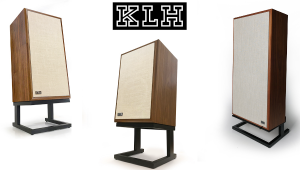I'm wondering about the timing issues mentioned in the article. Nyqvist theorem states that all information below 1/2 of the sample rate is preserved, INCLUDING the timing. Modern AD / DA with oversampling should not change the timing as well... right? And what's the advantage of higher sampling rates as we can not hear those frequencies? The disadvantages are known (e.g. modulation problems). But in the end t's about the proof in reality... I'm really curious to read about serious blind testing on MQA.
Audio Statesman: Meridian Founder Bob Stuart Page 2
 S&V: What are your thoughts on the current state of mass-market audio—and on the prospect of the High-Res Audio movement gaining traction among a broader audience of music enthusiasts and not just audiophiles?
S&V: What are your thoughts on the current state of mass-market audio—and on the prospect of the High-Res Audio movement gaining traction among a broader audience of music enthusiasts and not just audiophiles?Stuart: What I’ve been doing for the last three years almost exclusively is the MQA (Master Quality Authenticated) project. All through my career we continued to study psychoacoustics and the neuroscience of hearing, processing and all the different things that interact. But one of biggest things that sort of set me on this road was around 1999-2000 when we invented MLP (Meridian Lossless Packing), [a proprietary audio coding scheme that packs data into a smaller data rate without altering the final decoded signal.] It seems strange because everybody knows what lossless is today but it wasn’t known then. We invented it, took it out, and played it for the RIAA (Recording Industry Association of America) and said to people you should use this.
But at that time, particularly the DVD-Audio time—yes, it was interesting from an audio format point of view—but it was also very useful because we interacted a lot with the music industry, with the music labels kind of learning what they felt and how they operated. And we were able to gain their trust. We produced a technology and it worked.
S&V: And it was adopted as a standard…
Stuart: Yeah, we got it into the standard for DVD-Audio, DVD-Audio Recordable, and Blu-ray. When the high-res disc formats didn’t fly because of the format war between DVD-Audio and SACD, the industry kind of stalled. The optical discs were trying to do surround sound and some stuff that was kind of whacky, and we were there doing our bit on the audio quality. But at the same time, portable MP3 players started to appear and the thing that we know is that whenever you give someone the choice between quality and convenience, they tend to go for convenience and you can see that if you stand back and look at the market now.
There’s a tension between convenience and quality. If you look at the market you see that the MP3, the iPod, the very major undermining effect of the iTunes Store offering to sell tracks rather than albums—all these things set up a situation that led to a structural change in the music industry. It’s sort of meant that for companies like Meridian we had to focus on how to get the very best out of CD because CD was actually the only place people could get high-quality sound. Vinyl was gone and MP3 and iTunes sounded terrible so we put a lot of effort into the engineering and psychoacoustics of the whole thing.
S&V: A perfect segue into the work you’re doing today with MQA…
Stuart: Exactly. Meanwhile, what was happening in what we would call the audiophile area, is that gradually people got interested in higher sampling rates. We’ve seen this somewhat extreme download business develop at the same time the bulk of the market had in certain situations become even worse than iTunes because of streaming.
Against that whole picture, we realized that if there’s going to be a solution to this it would have to be comprehensive and one that the whole music industry was involved in. The problem that the music industry has, if you look at it from their point of view, is that their business has been out of their control, technically, since they introduced the vinyl record.
We just got this ridiculous explosion of different ways in which music can be distributed. And it’s not working because there are so many generations that are just excluded from the music market.
The vinyl record was introduced by two labels but everything else came from outside. Compact Disc came from outside, MP3 came from outside and they were not able to define their own carrier. And as a result we just got this ridiculous explosion of different ways in which music can be distributed. And it’s not working because there are so many generations that are just excluded from the music market.If you think back to the vinyl era, people just went to the record store and bought discs. Anybody could do that. And the same thing was true of the CD era. People would go to the store to buy a disc and it wasn’t very difficult to play one back. But in the download era, several generations were excluded because they didn’t know where the file was or how to do it, or it was too complicated and they got their kids to do it.
So the whole market fragmented and we felt that the only way to solve this was to get convenience and quality back together. Instead of music labels having 56 different things to sell—which is where it is today [in terms of file format options]—they have one version that is very convenient and at the same time their statement on quality. That was the thinking behind the MQA project.
Now, technically, of course, we had done a lot of studies on signal processing and into the neuroscience, in particular, where we discovered that the theory on which digital audio was built was flawed. In a simple sense, the human ear is much more sensitive to time than frequency but the CD was designed the other way around. People said frequencies are important; time will take care of itself. But, in fact, humans are so much more sensitive to timing that the CD system, good though it is, actually makes the sound bright and edgy compared to the original.
With MQA technology we’ve now got a file that’s twice the size of an MP3 but that is indistinguishable from the fullest level of the studio sound quality and small enough to stream, download, or put onto a CD—you can make an MQA CD that sounds amazing.
But the real breakthrough is the fact that we coding PCM into PCM—the origami method—which means if you don’t have an MQA decoder you can still hear it. Put in your computer it just plays back…It’s very versatile. For the last three years it’s really been tightening things up and socializing this idea around all the music labels. We demonstrated MQA to dozens of studios and label heads because we knew that without the consensus of the music industry there was no point in doing anything. But that if we didn’t do it, the music business would simply fragment into nothing.
S&V: Where does MQA stand now?
Stuart: We’ve been in deep discussions with three major labels and several of the big independents, including Japan, Korea, and Europe. [The Scandinavian label 2L announced support for MQA at CES] and we hope to have all three majors by Easter. That’s all preceding very well. We have good buy-in from independents and we’ve been talking to retailers. We’re also in preliminary discussions with a whole variety of streaming and download services. Last year, Tidal announced that they’re going to be supporting MQA.
A bunch of companies are involved in building the infrastructure. A dozen or so companies so far have announced they’re doing MQA and showing product—everything from those Onkyo and Pioneer portable players to high-end products and everything in between, including small wireless speakers, DACs, and USB DACs. And, of course, it also runs on your phone, so there are software players for mobile.
- Log in or register to post comments
































































